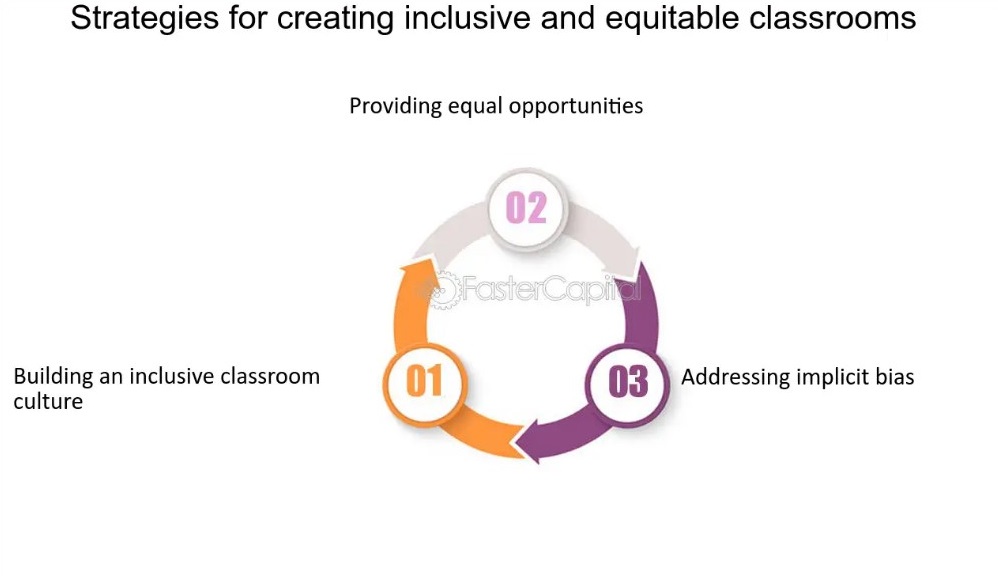
Every kid is entitled to an equal opportunity. Do you agree or disagree? What does equity in the classroom look like?
The duties of educators go much beyond the confines of academia. You probably call your students your ‘kids’ a lot, and you ought to be aware of the seriousness of that designation. Being aware of the vital position we play in our classroom is important. It's even more crucial to adjust your lesson to the variety of your classroom. For all of your children to achieve, you may actively eliminate obstacles in the classroom by encouraging equality. Here is a list of actions you can do right now to create a fair and inclusive learning environment for every kid.
Steps To Promote Collaboration And Equity In A Classroom

Here are a few meaningful strategies to foster a collaborative and equitable environment in a classroom:
Create an inclusive and diverse environment that influences how you interact with other people. Teachers might begin by encouraging open communication by emphasizing individual differences, teaching equality, and explaining why it matters. Establishing an atmosphere that appreciates each and every student begins with the use of inclusive teaching strategies, such as culturally responsive instruction.
It also involves establishing a secure environment in which pupils are at ease expressing their own identities. It's essential to establish deep connections with kids to provide a secure environment in which they feel heard, seen, and understood.
Hey, do you follow us on Social Media? We regularly share upgraded educational content, tips, feedback and more. Check us out by clicking the profiles here - Facebook / Twitter / LinkedIn / Pinterest / Instagram / YouTube
Although we, as their teachers, have little direct influence over the material they are exposed to through state-provided resources or their classroom textbook, we may assist our students in identifying biases and gaps.
By encouraging critical thinking, we enable our students to take an active rather than a passive role in their education, which promotes a culturally inclusive classroom climate. To broaden cultural horizons and guarantee that all points of view are taken into consideration, students impart their profound understandings and reasonings to their peers.
Relevance and responsiveness are related to the affective component of learning. Give kids the opportunity to identify with historical struggles, victories, and, most importantly, themselves.
Every phase aims to close the gap and establish a fair and welcoming learning environment for every student.
Including information from the community and family improves the learning process for the learner. Students who possess a rudimentary understanding of job pathways and clusters might begin to discern the rationale for their education.
Equal access for all of our children will be possible the more you can involve the community and family in our classrooms through field excursions, career days, guest lecturers, etc.
Creating a lesson plan that supports equity in the classroom might seem like a daunting endeavor. However, it doesn't have to be with the support of social and emotional learning exercises. Whether it is because of their learning preferences, culture, or socialization, students react differently to different kinds of information.
We can make sure that each student's demands are respected and fairly satisfied by making deliberate plans. Consider using learning stations to present several types of material. Give students a variety of resources at each station based on their preferred learning approaches.
Giving pupils a say and a choice in their education is essential. Realizing that fostering greater learning and justice in the classroom depends on a student's feeling of belonging. One important tool is to listen to them and base choices on their suggestions.
Take a poll with your pupils to find out how they prefer to study and demonstrate that they comprehend the material. By showcasing their uniqueness, giving our children a voice, and demonstrating the value of their opinions, we are empowering our pupils.
One effective strategy to improve the educational experience for all kids is to use language that is inclusive and encouraging. Acknowledge that when children's cultures and languages are included in the curriculum, they learn the material more efficiently.
Since not every student will benefit from traditional training, we must accommodate a range of learning styles. A strong feeling of community may be developed in the classroom by encouraging pupils to socialize and work together.
Practice Equity In Your Classroom
In the classroom, equity is a process rather than a finished product. Additionally, encouraging equity may benefit every kid in your class in a variety of ways. Therefore, as educators with a Master of Arts in Education with Special Educational Needs, you can influence personal growth and positively value differences in the classroom by fostering equity through positive classroom strategies.
We believe education should be accessible for everyone. That’s why we don’t charge for our blogs. Find the right course that will help you in your career with us, contact us at - 91-6292150868. You can mail us at act@asiancollegeofteachers.com
Get In Touch
UK – Registered OfficeAsian College Of Teachers Ltd (UK)
27, Old Gloucester Street, London – WC1N 3AX, UK
UK Toll Free: 0-808-189-1203
www.asiancollegeofteachers.co.uk
All SEN Courses are designed, developed and created by Asian College of Teachers Ltd, United Kingdom. These courses are certified by CPD Certification Service UK and endorsed by NCC Education, UK, and Short Courses from CACHE, UK through Laser Learning UK.
Asian College of Teachers (ACT) undertakes a continuous review of its teacher training courses to ensure imparting high quality education. However, there might be circumstances outside of ACT’s control which might affect its stakeholders like if you are planning to teach in a different country, applying for a teaching license, pursuing higher studies or trying to get the certificate approved by the Ministry of Education (MoE) of a particular country then you can do so with the certificate issued by Asian College of Teachers (ACT). However, each country’s Ministry of Education (MoE) or educational bodies set certain standards that are indispensable for the pursuit of higher studies or teaching in schools in that country. So it can be a possibility that you may be able to use the certificate for higher studies or teaching purposes in one country and not in another. Therefore, we strongly recommend that you investigate thoroughly and check with the relevant authorities regarding the acceptance of the certificate issued by us before you enrol on a particular course. ACT strives to offer high-quality education and its certificates can be valuable for various purposes internationally, but still it is crucial for individuals to verify the specific recognition of the certificate in the country they intend to use it, especially for formal education or professional licensing purposes. This approach ensures that the stakeholders make informed decisions regarding their educational and career paths.
© 2026 Asian College of Teachers. All Rights Reserved. Asian College Of Teachers is a trading brand of TTA Training Pvt. Ltd (India) - CIN U80902WB2016PTC215839, Asia Teachers Training Co., Ltd (Thailand) - Registration No. 0105558193360, Asian College Of Teachers Ltd (UK) - Company Number 9939942 & Asian College Of Teachers LLC, (USA) - Federal Tax Identification Number 30-1261596
Designed by kreativewebtech